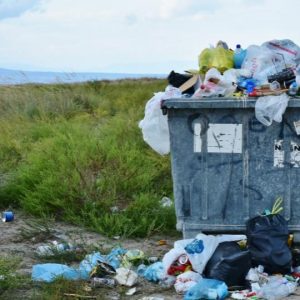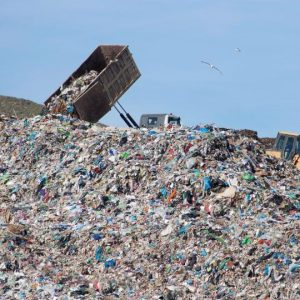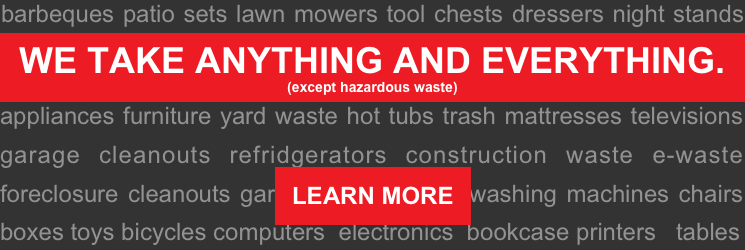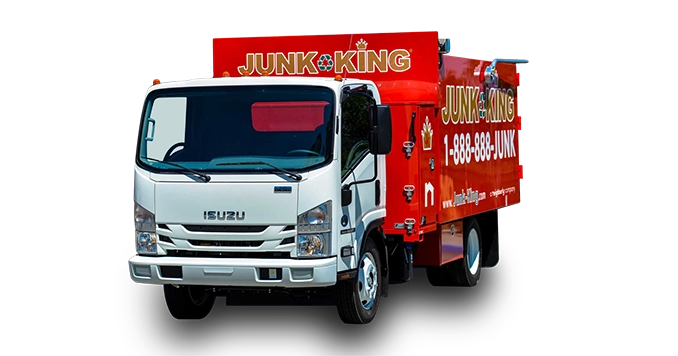When we’re young, we don’t really give any thought to where trash goes when the garbage truck picks it up. It magically vanishes, never to be seen again. As we get older and learn more about how the world works, though, we learn that it isn’t magic. Trash goes to a local landfill where it sits until it breaks down. This can take years. In order to get the most out of the space, some landfills compact garbage or arrange it in layers that can be buried by more junk or a layer of soil. Even with using these techniques, there’s so much trash going into landfills that it still isn’t a fully sustainable model. The EPA notes that in 2018, the U.S. created almost three million tons of waste. Out of that, almost 150 million tons went to the landfill. The other 150 million tons were recycled (70 million tons), composted (25 million tons), food waste that was used in various ways (18 million tons), or combusted using energy transfer methods (35 million tons). With almost half of the waste being redirected away from the landfill, it may seem like we’re managing our waste quite well. However, that’s not necessarily the case. The EPA also notes that our total waste generation has increased every year since the 1960s. While recycling rates have also jumped, there are still places where we can do better. Junk King Dayton is dedicated to the environment and reducing our impact on it. We understand that we’re leaving the planet to our children and grandchildren. We have a duty to protect as much of the Earth as we can so they don’t have to clean up our garbage. Let’s look closer at the impact of the landfill on the environment and what we can do to reduce that impact.

It All Adds Up
While three million tons of garbage is a lot, that’s just from one year. The EPA estimates that some 146 million tons of trash were in the landfill in 2018. Even if the U.S. held steady at the three million per year number, that means we’re now at over 158 million tons of junk in the landfill. That doesn’t count the waste that has been illegally dumped in the ocean, lakes, or rivers. That’s an entirely separate problem, especially since experts anticipate that the amount of plastic dumped in the ocean will tripled by 2040. If e just focus on what has been legally put in landfills across the country, the breakdown is interesting and actually hopeful. Food waste makes up a little over 24 percent of landfill trash. This is organic waste, so it breaks down fairly quickly. The nutrients in this type of waste can seep into the ground and actually help the soil. The next largest category is plastics. Plastic items make up about 18.5 percent of the trash in landfills. Plastics take a long time to break down—some may sit in the landfill for upwards of 500 years! Fortunately, some of these plastics can easily be recycled. The same is true with several large categories of trash. Paper (almost 12 percent), metals (9.5 percent), glass (5 percent) and other trash can all be recycled. As more cities roll out municipal recycling programs and recycling technologies improve, the amount of garbage in the landfill may start to decrease.

What Happens if the Landfills Fill Up?
The U.S. has around 2,000 landfills that are currently in use. What happens with our trash when those landfills run out? According to experts, we’re going to find out within about 18 years. That amount of time may be even smaller than we thought now that China has banned the import of certain recyclable plastics. The U.S. sends around a sixth of all its plastic recyclables to China for recycling, but some of those plastics now have nowhere to go. Even within the U.S., some states are already full. New York, for example, sends millions of tons of waste out of state to places like Alabama. What happens when there’s no more space anywhere? There are a few options. First, it will force people and companies to start recycling. City garbage programs may simply stop taking paper, cardboard, and certain plastics. Those will have to go in a recycling bin. This will likely come with new city ordinances and protocols for garbage pickup to better identify those who are still putting recyclable materials in their garbage. Companies will need to look into new ways of sorting their waste so that recyclable materials are recycled. Second, it will push forward the development of new recycling technology. Necessity is the mother of invention, as they say, and it is becoming necessary that we recycle as much as we possibly can. Third, the U.S. will need to start looking at other ways of dealing with its waste. Some countries have turned to burning trash. There are transfer stations in the U.S. that burn trash to create energy, and we may see more and more of these stations go into operation over the next decade or so. This process has to be done correctly, though, or we will simply go from polluting the land to polluting the air. Fourth, companies will need to look at ways of using less packaging for their products or using different materials. In some places this is obvious. For example, some frozen pizzas come packaged on a piece of cardboard sealed in plastic and then put in an additional box. That’s a lot of packaging for one item.

What About New Landfills?
Land that could be used for new landfills is becoming less and less available. Many people don’t want a new landfill put in near their residence, while businesses often also protest if the city tries to put one in near their location. There are also major concerns about pollution. Landfills cannot be places too near rivers, lakes, or the coastline because there’s the risk of contaminating the water. Rather than create new landfills, the best option is to increase how much we recycle or reuse while also reducing the amount of waste we create.
What Does Junk King Dayton Do to Help the Environment?
Junk King aims to help protect the environment by reducing the amount of waste that goes into the landfill. We do this with everything we collect, whether it goes in our truck or in one of our dumpsters. First, we take out anything that could be used by someone else, including furniture and appliances. If you have a sofa that’s still in good condition or an old refrigerator that still works, we’ll make certain it gets passed on to a local organization that needs it or can get it to those in need. This keeps these items out of the landfill, plus it helps those in and around Dayton who need a little assistance. If something can’t be reused, we’ll see if it can be recycled. We’ve partnered with various recycling centers in Dayton to handle the recyclables we bring in. We don’t just pass on cardboard and glass, either. We’ll disassemble furniture and appliances to get the metals and other materials out of them. We also recycle electronics. There’s a large amount of plastic and precious metals found in most electronic devices. These precious metals include gold, copper, and palladium, all of which can be quite valuable. By recycling these materials, we’re helping to keep the costs of future electronics from getting out of hand. Once we’ve redirected usable items and pulled out the recyclables, there’s usually only about a third of all the junk we picked up left to go to the landfill. We’re always looking to reduce that amount even more, too.
What Does Junk King Haul Off?
We will take just about anything you have, including old furniture, appliances, electronics, yard waste, and construction debris. The only thing we’re unable to take are items classified as hazardous waste. If you have items that are considered hazardous, we may be able to direct you to a disposal team that can take them, but for our safety, we cannot.
How Does it Work?
Junk King Dayton has a very simple and easy to use process. Once you have gathered the junk and trash you want us to haul off, you give us a call. We will provide you with a free, no-obligation estimate that will include all of the costs and fees of the job. When we arrive, we’ll do a quick in-person estimate to confirm the price. In addition to calling us, you can also text us photos and information about the items you need hauled away. Again, we’ll confirm everything with an in-person estimate, but this will give us a good idea of the scope of the job and give you a good idea of the cost. You can also use our online price estimation tool and book your appointment online. Want to know more? Call us or send us a text.



